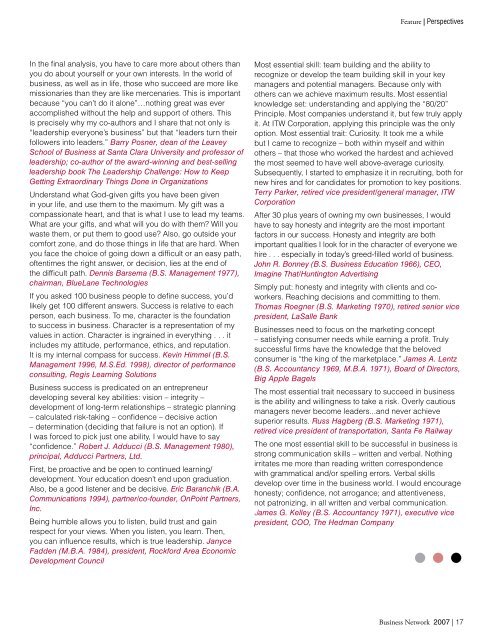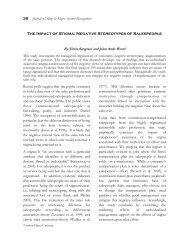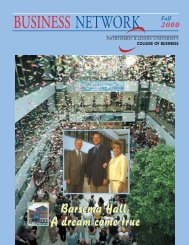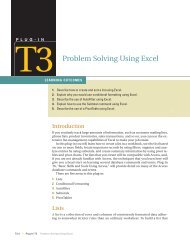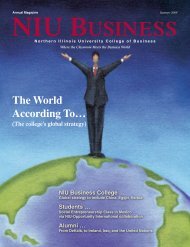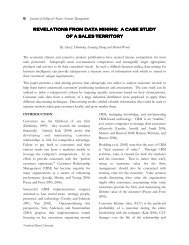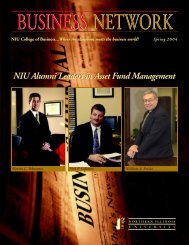Spring 2007 Issue - NIU College of Business - Northern Illinois ...
Spring 2007 Issue - NIU College of Business - Northern Illinois ...
Spring 2007 Issue - NIU College of Business - Northern Illinois ...
- No tags were found...
Create successful ePaper yourself
Turn your PDF publications into a flip-book with our unique Google optimized e-Paper software.
Feature | PerspectivesIn the final analysis, you have to care more about others thanyou do about yourself or your own interests. In the world <strong>of</strong>business, as well as in life, those who succeed are more likemissionaries than they are like mercenaries. This is importantbecause “you can’t do it alone”…nothing great was everaccomplished without the help and support <strong>of</strong> others. Thisis precisely why my co-authors and I share that not only is“leadership everyone’s business” but that “leaders turn theirfollowers into leaders.” Barry Posner, dean <strong>of</strong> the LeaveySchool <strong>of</strong> <strong>Business</strong> at Santa Clara University and pr<strong>of</strong>essor <strong>of</strong>leadership; co-author <strong>of</strong> the award-winning and best-sellingleadership book The Leadership Challenge: How to KeepGetting Extraordinary Things Done in OrganizationsUnderstand what God-given gifts you have been givenin your life, and use them to the maximum. My gift was acompassionate heart, and that is what I use to lead my teams.What are your gifts, and what will you do with them? Will youwaste them, or put them to good use? Also, go outside yourcomfort zone, and do those things in life that are hard. Whenyou face the choice <strong>of</strong> going down a difficult or an easy path,<strong>of</strong>tentimes the right answer, or decision, lies at the end <strong>of</strong>the difficult path. Dennis Barsema (B.S. Management 1977),chairman, BlueLane TechnologiesIf you asked 100 business people to define success, you’dlikely get 100 different answers. Success is relative to eachperson, each business. To me, character is the foundationto success in business. Character is a representation <strong>of</strong> myvalues in action. Character is ingrained in everything . . . itincludes my attitude, performance, ethics, and reputation.It is my internal compass for success. Kevin Himmel (B.S.Management 1996, M.S.Ed. 1998), director <strong>of</strong> performanceconsulting, Regis Learning Solutions<strong>Business</strong> success is predicated on an entrepreneurdeveloping several key abilities: vision – integrity –development <strong>of</strong> long-term relationships – strategic planning– calculated risk-taking – confidence – decisive action– determination (deciding that failure is not an option). IfI was forced to pick just one ability, I would have to say“confidence.” Robert J. Adducci (B.S. Management 1980),principal, Adducci Partners, Ltd.First, be proactive and be open to continued learning/development. Your education doesn’t end upon graduation.Also, be a good listener and be decisive. Eric Baranchik (B.A.Communications 1994), partner/co-founder, OnPoint Partners,Inc.Being humble allows you to listen, build trust and gainrespect for your views. When you listen, you learn. Then,you can influence results, which is true leadership. JanyceFadden (M.B.A. 1984), president, Rockford Area EconomicDevelopment CouncilMost essential skill: team building and the ability torecognize or develop the team building skill in your keymanagers and potential managers. Because only withothers can we achieve maximum results. Most essentialknowledge set: understanding and applying the “80/20”Principle. Most companies understand it, but few truly applyit. At ITW Corporation, applying this principle was the onlyoption. Most essential trait: Curiosity. It took me a whilebut I came to recognize – both within myself and withinothers – that those who worked the hardest and achievedthe most seemed to have well above-average curiosity.Subsequently, I started to emphasize it in recruiting, both fornew hires and for candidates for promotion to key positions.Terry Parker, retired vice president/general manager, ITWCorporationAfter 30 plus years <strong>of</strong> owning my own businesses, I wouldhave to say honesty and integrity are the most importantfactors in our success. Honesty and integrity are bothimportant qualities I look for in the character <strong>of</strong> everyone wehire . . . especially in today’s greed-filled world <strong>of</strong> business.John R. Bonney (B.S. <strong>Business</strong> Education 1966), CEO,Imagine That/Huntington AdvertisingSimply put: honesty and integrity with clients and coworkers.Reaching decisions and committing to them.Thomas Roegner (B.S. Marketing 1970), retired senior vicepresident, LaSalle Bank<strong>Business</strong>es need to focus on the marketing concept– satisfying consumer needs while earning a pr<strong>of</strong>it. Trulysuccessful firms have the knowledge that the belovedconsumer is “the king <strong>of</strong> the marketplace.” James A. Lentz(B.S. Accountancy 1969, M.B.A. 1971), Board <strong>of</strong> Directors,Big Apple BagelsThe most essential trait necessary to succeed in businessis the ability and willingness to take a risk. Overly cautiousmanagers never become leaders...and never achievesuperior results. Russ Hagberg (B.S. Marketing 1971),retired vice president <strong>of</strong> transportation, Santa Fe RailwayThe one most essential skill to be successful in business isstrong communication skills – written and verbal. Nothingirritates me more than reading written correspondencewith grammatical and/or spelling errors. Verbal skillsdevelop over time in the business world. I would encouragehonesty; confidence, not arrogance; and attentiveness,not patronizing, in all written and verbal communication....James G. Kelley (B.S. Accountancy 1971), executive vicepresident, COO, The Hedman Company<strong>Business</strong> Network <strong>2007</strong> | 17


